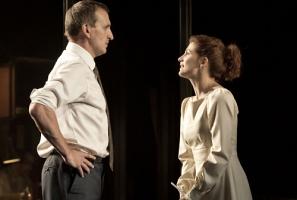Antigone
While modern day Greece wages a financial struggle against austerity and wrestles with its partners in the Euro, back in the dim recesses of Greek mythology the battles were somewhat similar, and also concerned money - 'The virus that infects mankind' as a character in this play by Sophocles tells us. It all starts with the end of a war, and ends, like many tragedies, with blood on the hands of the leading players, and a pile of dead bodies.
Almost from the start of this modernised version of this famous play, director Polly Findlay makes a crystal-clear connection with recent history. It starts with a crowd of generals and bureaucrats and the soon-to-be King, Creon, gathered round a TV screen watching the war ending, and perhaps the demise of Creon's rivals. It is exactly the same image that we saw when Osama Bin Laden was eventually killed by American forces back in May last year and witnessed live by President Obama and his Secretary of State, Hilary Clinton and many of his generals and aides. It's a gruesome image of our times, but perfectly fits this story about the power of the state and the rights of the individual.
The backstory to 'Antigone' would take a few hours to relate, so I will keep it as brief as I can. A war has been raging in Thebes. Polynices and his brother (both offspring of Oedipus) have killed each other on the battlefield. Creon has become king and decides that Polynices's body will not be buried but will be left to rot on the battlefield. Polynices's sister, Antigone is determined to go against the new King's decree and bury her brother. When Creon discovers what she has done, he condemns her to be buried alive in a cave in spite of that fact that she is his niece and betrothed to his son. A hard man if ever there was one. But Creon's decision turns out to be catastrophic for him, his wife and his son.
For the first half an hour or so, I wondered if I had accidentally strayed onto the set of a popular TV soap, and that's because you would think that someone had gone through the cast with an emotional sanitiser. For example, when Jodie Whittaker's Antigone and Annabel Scholey's Ismene are discussing the very recent deaths of their two brothers, you would think they were talking about the high price of sliced bread in the corner shop. In spite of Antigone's concern about burying her brother, there's not a tear in sight, nor even a gasp of breath or a slight hesitation, and certainly nothing to indicate any real sense of grief or overwhelming distress. But that seemed to be the style of the play in general at least for the first half - later there is more emotion on display, but even then it seemed muted.
Christopher Eccleston - ex-star of TV's Dr Who - is the hard-nosed King Creon. In spite of his treatment of Antigone, he is more like a bureaucratic businessman than a really menacing, autocratic monarch. There's much of Obama and Blair in Mr Eccleston's performance, and given the subject matter, you can see why. In keeping with his former role, Mr Eccleston encounters the wrath of the prophet, Teiresias who is not only blind, but has facial scarring worthy of any alien from the popular TV series. Luke Norris, as a soldier who has to bring the news to Creon about Antigone burying her brother, makes a terrific impression, almost stealing the show with his nervy, quivering reluctance to deliver his message because, he says: "The bloke that brings bad news never gets a medal". How true.
There's a little tongue-in-cheek humour in Soutra Gilmour's design. The crumbling, war-damaged walls at the edge of the stage contain the very same concrete patterning of the walls inside the Olivier theatre - the trade-mark texture which one instantly recognises as the fabric of the National Theatre. In other respects, the setting is a modern office, with several glass booths towards the back and desk space for the Chorus - here defined as the generals and officials who serve King Creon.
Short at around 90 minutes, 'Antigone' manages to encapsulate the essential conflicts between politics, power, the rights of the individual and common humanity. Though the play itself is powerfully insightful and still resonates, this production is hardly one of the National's greats, largely because it fails to ignite our emotions.
"Stirring new production."
Michael Billington for The Guardian
"Findlay's direction has both focus and scale; her vision of the play is urgent and completely sustained. "
Henry Hitchins for The Evening Standard
"As gripping and topical as anything on the London stage. . "
Charles Spencer for The Daily Telegraph
External links to full reviews from popular press
Guardian - Telegraph -
Originally published on
